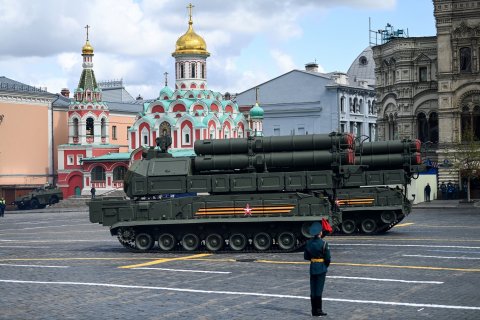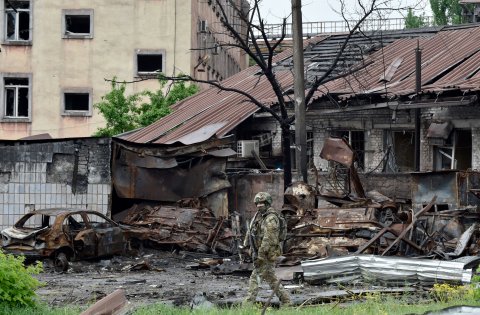After almost three months of humanitarian catastrophe, an end to Russia's war in Ukraine appears to be farther away than ever. Russia did not achieve the quick victory that Kremlin planners seem to have expected back in February, and yet Vladimir Putin shows no sign of abandoning his original aims to "demilitarize" and "denazify" Ukraine. Ukraine's armed forces, supported by material aid from the West and moral support from a domestic population that increasingly sees this conflict as an existential struggle, remain highly motivated to defend their state from outside aggression. It is the perfect recipe for a fierce stalemate.
"Russia probably does not have sufficient manpower to mount offensives against large cities," says Nikolai Topornin, an international relations professor at a major Moscow university and a reservist officer in an artillery corps. "Maybe Russia can take some of the smaller towns in the Donetsk and Lugansk region — Kramatorsk, Severodonetsk, Sloviansk — but the idea that it will be possible to occupy regional centers like Dnipro or Zaporizhia is unrealistic given the current balance of forces."
Despite the Russian president's claims at the May 9 military parade that Russia was fighting to bring about "a world with no place for executioners, thugs, and nazis," the Russian political leadership has not mobilized its population for war. Russia's official designation of its actions in Ukraine as a "special military operation" means that conscripts cannot be sent into battle on Ukrainian soil. Even if the Kremlin officially declares war in the coming days, it would still take weeks to outfit and retrain reservist call-ups and months to get the next batch of conscripts ready for actual combat.
This reality does not mean that a Ukrainian victory is imminent. "Even the Ukrainians admit that Russia has an advantage in firepower: tanks, artillery, rockets, airplanes," Topornin added. "That makes it almost impossible to drive Russian troops out of the territory that they already occupy. The war is likely to take on a more protracted character, with continuing battles in the east and periodic strikes to prevent regular life from resuming in the areas of Ukraine behind the front lines."

Nataliya Gumenyuk, founder of the Ukrainian Public Interest Journalism Lab, said "we can call the Russian tactics a 'scorched earth' strategy, but it doesn't look much like an actual military plan."
"At the start of the war, the Russians wanted to capture and control cities, but they could not do this," Gumenyuk says. "Now it looks like they do not want to get into the fights in the cities, but to shell them to the point that there's nothing left to defend. Russia could not take and hold a city like Mariupol, so they destroyed it, as if to say 'perhaps we cannot conquer you, but we can at least punish you.'"
This fact is not lost on those living under the constant threat of Russian bombardment. Every week sees dozens of such strikes, mostly concentrated against large northern cities such as Kharkiv and Kyiv, but also stretching south to Mykolaiv and Odesa on the Black Sea coast, and occasionally hitting as far west as Lviv.
"After Bucha and Mariupol, we understand that for us this is an existential battle," says Oleksiy Honcharenko, a deputy in Ukraine's Verkhovna Rada. "Everyone wants the bloodshed to stop, but we understand that if we stop fighting, the bloodshed will only be worse. That's why we need more artillery, more anti-aircraft and missile defense systems, more armored vehicles, and further political support from the West. Ukrainians of course are suffering most of all from this war, but if we cannot maintain our independence, Russia will destroy us as a people."
Volodymyr Yermolenko, editor-in-chief of independent media outlet UkraineWorld, said "nothing short of a total defeat can stop the Russian leadership from continuing to prosecute this war."
"Russia is a wounded empire, much like Nazi Germany and fascist Italy were, and Ukrainians understand that any deal to lay down our arms would only lead to further massacres like the one we saw in Bucha," he said. "We should be prepared for a very long struggle."
Ukrainian society — by every indication, correctly — believes that it is engaged in a fight to the death with the Russian Federation. It is not simple pride or territorial ambition that prevents the Kyiv government from conceding to Russian demands for "demilitarization" or "forced neutrality" — it is existential fear. Russia is bombing maternity hospitals and civilian shelters in Kharkiv and Mariupol and calling its actions a "liberation." Ukrainian society has every reason to believe that without the protection of its Western-backed army, Russian artillery would soon do the same to Kyiv and Odesa.

In Moscow, the conflict is also viewed in existential terms, largely due to the Kremlin's clampdown on the spread of unofficial information.
"It's a confirmed fact that Ukrainian nationalist battalions were preparing an attack not only against the Donbas territories, but possibly also against Russia itself," says Alexander Kazakov, a Moscow-based political strategist who from 2014-2018 served as a top advisor to former "Donetsk People's Republic" head Alexander Zakharchenko. "If we hadn't started our operation on February 24, then there would already be hundreds of thousands of dead as a result of ethnic cleansing carried out by the Kyiv regime."
Kazakov's claims echo official statements made by the Russian Ministries of Defense and Foreign Affairs, neither of which has presented the slightest bit of evidence to support the accusation. Still, the fact that such obviously apocryphal histories have become gospel in Kremlin circles suggests that decision makers in Moscow are waging this war based on a calculus that is largely divorced from objective reality.
"The only reason our troops were sent towards Kyiv during the first phase of the fighting," Kazakov offers the official Russian version of the war's opening weeks, "was to prevent the enemy from building up their forces in the east of the country. It was part of the strategy. Now begins the second phase, in which we will encircle the Ukrainian army in a pocket. If they surrender, then the war will be over quickly; if they fight, then it may drag on a little longer, but regardless, following the liquidation of that pocket of resistance, events will move very rapidly. The aims of the third phase are the same objectives that were announced on February 24: demilitarization and denazification. When that process is completed, the former Ukraine will be no more."
Nearly every independent military analyst in the world vehemently disagrees with Kazakov's assessment that the Russian war effort thus far has been a brilliant plan brilliantly executed. This fact offers minimal comfort.
Dr. Margarita Konaev, deputy director of analysis at the Center for Security and Emerging Technology, is one of those independent analysts. "There's general agreement that the Russian military is not in a great state," Konaev says, "but politics drives war, and the Russian military will abide by political directives. So long as there is a political directive to continue the fight, the military will at least try to carry out orders."
Committing further crimes against humanity might offer the Kremlin leadership its only chance at avoiding responsibility for the crimes against humanity it has committed thus far. Having started this war, their personal freedom largely depends on their capacity to remain in power inside Russia, where the justice system and security services remain firmly under their control. Any military outcome short of victory could raise uncomfortable questions inside the regime about what this "special operation" was really for.
It is most likely — though far from guaranteed — that Ukrainians will keep up their resistance for longer than Putin can retain his hold on power in Moscow, but their material capacity to continue the fight depends upon the democratic world's political will to continue providing Kyiv with military and economic aid. Paradoxically, each lethal weapon that crosses the Polish border decreases the chances that the next Bucha massacre or Mariupol punishment operation occurs.
However, if the bloody battlefield videos from eastern Ukraine gut Western capitals' stomach to continue supporting Ukraine's defensive efforts, the consequences — for disarmed Ukrainians facing reprisals, for Russian dissidents living under an emboldened totalitarian regime, and for Europeans stuck on the border with a nuclear-armed expansionist empire — will almost certainly be worse than anything that has come before.
In either case, the most pertinent remaining questions are: how many Russians and Ukrainians will be killed, how brutally, and for how long before one side or the other ultimately collapses?
As Konaev cryptically sums up the situation, "It's only been a little over two months, the Russian military is almost certainly suffering from even more vulnerabilities than we can see from the outside, and yet the fighting has been intense enough to displace a third of the Ukrainian population from their homes. The Russian military does not have to be effective in order to cause serious damage. We've seen that."
The world should be prepared to see more of it, and to see it for far longer than most objective outside observers imagine is possible.













